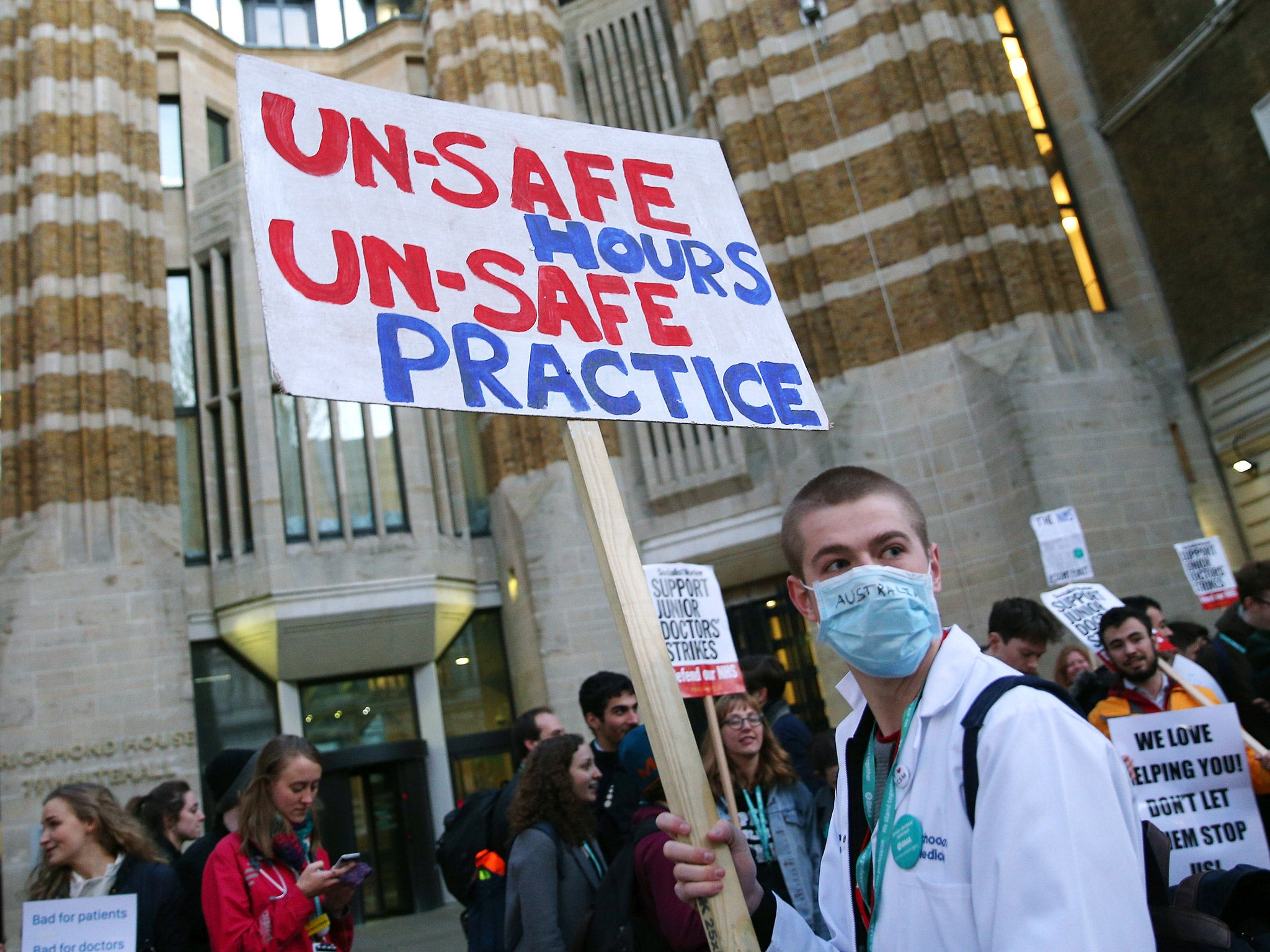Junior doctors launch legal challenge to Jeremy Hunt’s decision to impose new contract
It also announced three 48-hour strikes affecting non-emergency services, to take place in March and April

Your support helps us to tell the story
From reproductive rights to climate change to Big Tech, The Independent is on the ground when the story is developing. Whether it's investigating the financials of Elon Musk's pro-Trump PAC or producing our latest documentary, 'The A Word', which shines a light on the American women fighting for reproductive rights, we know how important it is to parse out the facts from the messaging.
At such a critical moment in US history, we need reporters on the ground. Your donation allows us to keep sending journalists to speak to both sides of the story.
The Independent is trusted by Americans across the entire political spectrum. And unlike many other quality news outlets, we choose not to lock Americans out of our reporting and analysis with paywalls. We believe quality journalism should be available to everyone, paid for by those who can afford it.
Your support makes all the difference.Junior doctors have a launched a legal challenge to Jeremy Hunt’s decision to impose a new contract, and announced that three fresh strikes will hit the NHS in the spring.
Preparing the ground for a new phase in the bitter conflict between the British Medical Association and the Government, the medical union claimed that ministers had failed to assess whether the contract might discriminate against particular groups of junior doctors.
It also announced three 48-hour strikes affecting non-emergency services, to take place in March and April.
The decision came as a former Government advisor on patient safety called on ministers to apologise to junior doctors over their handling of the contract dispute, and to freeze its imposition for up to three years.
Don Berwick, a US expert who helped shape Barack Obama’s health policy and conducted a review of NHS patient safety under the Coalition, said the Government had made a “mistake” and needed to “find a way out”.
“You cannot achieve excellence in combat with your future workforce, it makes no sense at all,” he said at an event at the King’s Fund think-tank on 23 February.
Jeremy Hunt announced the imposition of the new junior doctor contract, which will cut weekend pay rates in exchange for an increase in basic pay, earlier this month, after being advised by his chief negotiator that talks with the BMA had reached a dead end.
The imposed contract, while providing better terms for junior doctors on pay and working hours than the Government’s previous offers, is still opposed by the BMA, who say that cuts to out-of-hours pay would heavily impact specialties that demand the most night and weekend shifts, such as A&E, maternity and paediatrics.
Danny Mortimer, chief executive of the NHS Employers organisation, which has negotiated the new contract on behalf of the Government, said the disruption a new wave of strikes would cause was “unnecessary” and urged junior doctors to “look at the contract in detail”.
“I strongly believe that the final contract is safe, fair and reasonable,” he said.
However, Dr Johann Malawana, chair of the BMA’s junior doctor committee, said that junior doctors had “no confidence” in the new contract.
“In recent weeks I have heard from thousands of junior doctors across the country, and the resounding message is that they cannot and will not accept what the Government is trying to do,” he said.
“Imposing this contract will seriously undermine the ability of the NHS to recruit and retain junior doctors in areas of medicine with the most unsocial hours, where there are already staffing shortages.”
The contract imposed by the Government is intended to be cost-neutral, but the BMA says that if ministers want to deliver on a manifesto pledge of improving weekend services in hospitals, then more doctors, nurses, and support staff would be needed.
The BMA’s judicial review application will centre on whether the Government carried out an Equality Impact Assessment of the new contract before imposing it, and whether this met a legal requirement to pay “due regard” to eliminate discrimination.
It is thought that the BMA will argue that the new contract may discriminate against women, who are more likely to be part-time doctors, who the union says are more likely to lose out under the new contract.
A Department of Health spokesperson said the new wave of strike action was “completely unnecessary” and would lead to tens of thousands of cancelled operations.
“The new contract will mean an average 13.5 per cent basic pay rise, and will bring down the maximum number of hours doctors can work. We urge junior doctors to look at the detail of the contract and the clear benefits it brings,” the spokesperson said.
Join our commenting forum
Join thought-provoking conversations, follow other Independent readers and see their replies
Comments